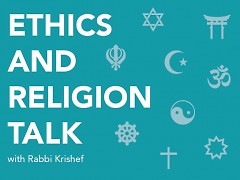We begin this week with two Protestant responses and a Unitarian for variety. We’ll continue this question next week with Orthodox, Catholic, Hindu, and Jewish responses.
Rev. Ray Lanning, a retired minister of the Reformed Presbyterian Church of North America, responds:
“Presbyterians believe that ‘God is a Spirit’ (John 4:24) and ‘hath not flesh and bones’ (Luke 24:39). The image of God in man cannot be anything physical or visible. Reformed theologians instead point to spiritual qualities or powers such as knowledge, righteousness, and holiness, seated in the soul or inward man, not in our outward parts. The human body is but a tabernacle for the soul to dwell in (II Corinthians 5:1).
“In addition, God gave humanity dominion over the earth (Gen. 1:29, Psalm 8:4-8)), to rule over it as God rules over all created things. This grant of dominion was joined to a charge (Gen. 2:15) to ‘dress’ the earth (labor to make it productive) and to ‘keep it’ (protect and preserve it), just as God upholds and provides for all His creatures.
“Our fall into sin marred the image of God in us and perverted our role as rulers and stewards of the planet. We became tyrants and oppressors, making war on each other while plundering the earth, leaving waste and destruction in our path (Isaiah 59:7). The divine image was defaced and eroded. Today we inherit a humanity greatly diminished by sin. The situation cries out for reconciliation and restoration, and that was Christ’s mission in the world (I Timothy 1:15).”
The Rev. Sandra Nikkel, head pastor of Conklin Reformed Church, responds:
“This comes from Genesis 1:26 ‘Then God said, Let us make mankind in our image, in our likeness, so that they may rule over the fish in the sea and the birds in the sky, over the livestock and all the wild animals, and over all the creatures that move along the ground.’
“The Hebrew text uses two different words to describe the way God made us which are translated in English as: image and likeness. As I meditated on these two words, I thought of two different ways in which parents often describe their children resemblance to them--physical resemblance and character resemblance. I believe this is part of what the verse is trying to convey. Although God does not have a human body like ours, in our physical bodies we were made to resemble Him. The Bible speaks of God as having a mouth, hands, and feet. But we were also made to resemble God in our character and emotions. Like God, we too, are capable of experiencing joy, anger, and sadness. Furthermore, God created us to do good and to reject evil. Yet, he gave us the freedom to follow good or follow evil. As parents we can relate to the joy we feel when our kids resemble the good things we do or follow the wisdom we share with them. May our lives emulate the image and likeness of our God as we navigate this world.”
The Reverend Colleen Squires, minister at All Souls Community Church of West Michigan, a Unitarian Universalist Congregation, responds:
“I will assume other clergy on this panel will answer by lifting up the passages found in Genesis or in 1st Corinthians but as a Unitarian Universalist I would not solely rely on scripture for my answer. This question actually brings to mind the ancient Indian folk tale of the blindfolded people examining the elephant. Each person stands at one part of the elephant feeling only what is in front of them. The person feeling the trunk thinks this is a large snake, the person near the ear believes it to be a fan, and the person at the tail thinks it’s a rope. Others feel a pillar or a wall and so on. Each person is faithfully examining the elephant and each person believes what they are experiencing is the truest representation of this great being in front of them.
“I think those of us who believe in God also believe in what our idea or image of God as the sole truth. Some will see God as Michelangelo did in his Creation of Adam, others might imagine the face of Jesus, and for some The Burning Bush or a mountaintop or as a spectacular sunset. We all have our sincerest beliefs and yet we are only human and should be humbled by all that we do not know. I know when I have held a new born infant in my hands I have felt the presence of God in the room. And I have also witnessed incredible hatred in my fellow men and I know in my heart that is not the image of God I believe in.”
This column answers questions of Ethics and Religion by submitting them to a multi-faith panel of spiritual leaders in the Grand Rapids area. We’d love to hear about the ordinary ethical questions that come up on the course of your day as well as any questions of religion that you’ve wondered about. Tell us how you resolved an ethical dilemma and see how members of the Ethics and Religion Talk panel would have handled the same situation. Please send your questions to [email protected].
The Rapidian, a program of the 501(c)3 nonprofit Community Media Center, relies on the community’s support to help cover the cost of training reporters and publishing content.
We need your help.
If each of our readers and content creators who values this community platform help support its creation and maintenance, The Rapidian can continue to educate and facilitate a conversation around issues for years to come.
Please support The Rapidian and make a contribution today.
